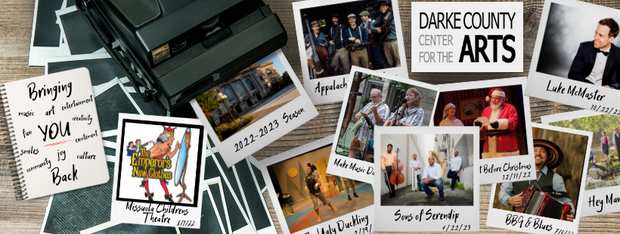
by Marilyn Delk | DCCA
Our local public radio station, WDPR/WDPG, launched its semi-annual membership drive this past Sunday, and while continuing to play classical music, has constantly bombarded listeners with reasons for supporting the station which without interruption sends music to listeners across the country and around the world 24 hours a day, seven days a week. In addition to inspiring me to contribute, the gently pushy commentary by on-air staff and volunteers also inspired consideration of the value of music to my life—and to society.
One of my favorite writers, Kurt Vonnegut, once wrote that any art—music, dancing, acting painting, writing—helps make your soul grow. Ancient philospher Plato said “Music gives a soul to the universe, wings to the mind, flight to the imagination, and life to everything.” Rock star Bono sums up his belief in the power of music by saying “Music can change the world because it can change people.” Powerful words indeed!
Academic studies have provided actual scientific evidence that music is beneficial to health and well-being. Starting with the now controversial “Mozart Effect” study that was purported to show that listening to classical music actually improves brain function, a finding that the original researchers emphasized as a positive but temporary phenomenon, scientists and healthcare professionals have undertaken a variety of studies ultimately showing multiple positive impacts. Neuroscientists have discovered that listening to music affects many areas of the brain, thus heightening positive emotion—essentially making people feel good.
Some evidence exists demonstrating that music’s positive impact on health can be more powerful than medication. Biological markers of stress—increased heart rate, high blood pressure—have been prevented or decreased by listening to music. In fact, one study has shown that the effects of music were more powerful than an orally-administered drug in managing pain for surgery patients. The reasons for this positive reaction are not clear, but researchers have concluded that music’s pain-killing properties are real, and not related to patients’ expectations. Other preliminary research has led to the conclusion that music has the potential to stimulate immune response systems; analysis shows the positive promise of music as medicine which is natural, cheap, and totally without unwanted side effects.

Music may also aid memory, a thesis leading to study of its impact on those suffering memory loss due to medical conditions such as stroke and dementia. Such studies have shown that stroke patients who listened to music showed more improvement on verbal memory and focused attention, as well as less depression and confusion than those in a control group. Similarly, mood, orientation, and memory were improved in dementia patients who sang and/or listened to music.
Anyone who has ever rolled down car windows and turned up the radio understands that music can be energizing, and there is solid science reinforcing that experience. Researchers have found that music helps reduce fatigue and maintain muscle endurance, confirming the belief that music can enhance physical performance, and explaining how music enables longer physical workout sessions
In 2009, archaeologists excavating a cave in Germany uncovered a flute carved 40,000 years ago from the wing bone of a vulture, indicating that music has been a factor in human lives for—well, a very, very long time. Music connects us to others, past and present, and remains a powerful tool in uniting us. Protest songs stir a sense of shared purpose, while the national anthem connects crowds attending sporting events and other gatherings. Hymns bring people together in houses of worship, while love songs and lullabies simply bring people together.
While WDPR/WDPG sends music to listeners around the world, Darke County Center for the Arts brings live music to our community; both exert a positive influence on lives. As Jon Meacham wrote in Songs Of America, “Song has a universal message, is musically uplifting, and sends messages of hopes and dreams . . .. The song of America is not finished; the last notes have not yet been played. In that spirit, in that cause, now and always, let us lift every voice and sing.”


